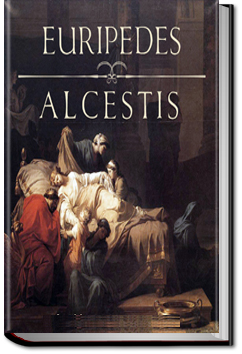

APOLLO.
No. To keep death for them that linger late.
THANATOS (still mocking).
'Twould please thee, so?… I owe thee homage great.
APOLLO.
Ah, then she may yet … she may yet grow old?
THANATOS (with a laugh).
No!… I too have my rights, and them I hold.
APOLLO.
'Tis but one life thou gainest either-wise.
THANATOS.
When young souls die, the richer is my prize.
APOLLO.
Old, with great riches they will bury her.
THANATOS.
Fie on thee, fie! Thou rich-man's lawgiver!
APOLLO.
How? Is there wit in Death, who seemed so blind?
THANATOS.
The rich would buy long life for all their kind.
APOLLO.
Thou will not grant me, then, this boon? 'Tis so?
THANATOS.
Thou knowest me, what I am: I tell thee, no!
APOLLO.
I know gods sicken at thee and men pine.
THANATOS.
Begone! Too many things not meant for thine
Thy greed hath conquered; but not all, not all!
APOLLO.
I swear, for all thy bitter pride, a fall
Awaits thee. One even now comes conquering
Towards this house, sent by a southland king
To fetch him four wild coursers, of the race
Which rend men's bodies in the winds of Thrace.
This house shall give him welcome good, and he
Shall wrest this woman from thy worms and thee.
So thou shalt give me all, and thereby win
But hatred, not the grace that might have been.
&n
Get ALL YOU CAN BOOKS absolutely FREE for 30 days. Download our FREE app and enjoy unlimited downloads of our entire library with no restrictions.
Have immediate access and unlimited downloads to over 200,000 books, courses, podcasts, and more with no restrictions.
Everything you download during your trial is yours to keep and enjoy for free, even if you cancel during the trial. Cancel Anytime. No risk. No obligations.
For just $24.99 per month, you can continue to have unlimited access to our entire library. To put that into perspective, most other services charge the same amount for just one book!

As avid readers, we understand the joy of immersing ourselves in a captivating story or getting lost in the pages of a good book. That's why we founded All You Can Books back in 2010, to create a platform where people can access an extensive library of quality content and discover new favorites.
Since our founding days, we’ve continuously added to our vast library and currently have over 200,000 titles, including ebooks, audiobooks, language learning courses, podcasts, bestseller summaries, travel books, and more! Our goal at All You Can Books is to ensure we have something for everyone.
Join our community of book lovers and explore the world of literature and beyond!